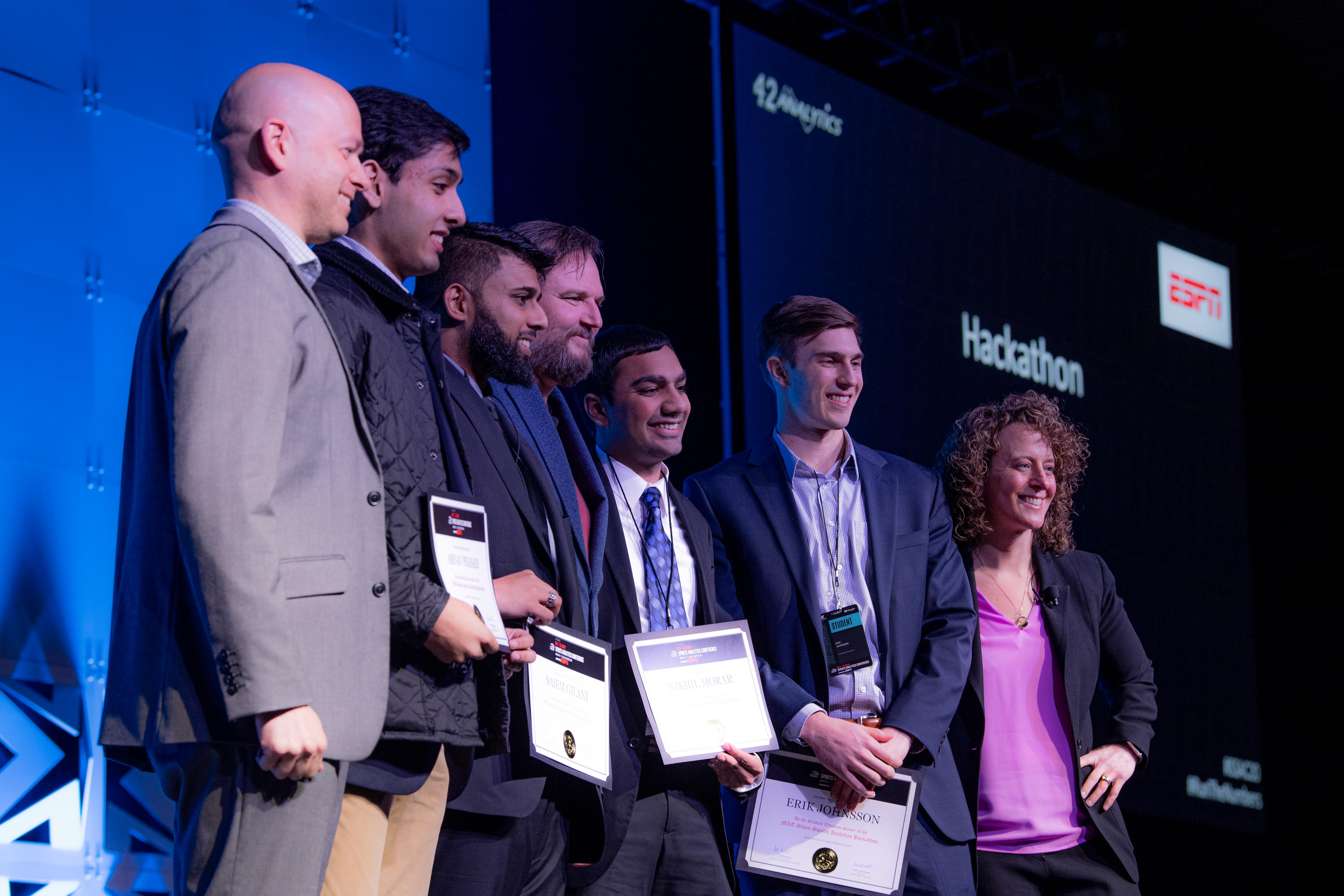Undergrad Part of Winning Hackathon Team at Top Sports Analytics Conference

While not on the field, court, or ice, data analysts are crucial to the success of every modern sports team. Each year, these secret weapons gather in Boston for the annual MIT Sloan Sports Analytics Conference, exchanging new ideas and methods with colleagues in the sports and business world. For his first visit to Sloan, second-year Arnav Prasad came home with a special souvenir — an award for winning the student division of the conference’s annual ESPN hackathon.
In Prasad’s project, which used statistical approaches to reconstruct and predict basketball shot arcs, he drew upon technical skills acquired in UChicago CS courses including Introduction to Data Science, Introduction to Data Engineering, and the CS 120 sequence of Computer Science with Applications, he said.
“The curriculum has really provided me with a formal education around best-practices — I have to write code not only for my personal use, but for others to read and understand as well,” Prasad said. “The computer science classes I have taken here have helped me develop a foundation to explore more advanced concepts, methods, and applications in my own time. The CS 120s sequence has been very time-intensive, but that challenge has really helped me become a more efficient developer and architect.”
The hackathon win is just Prasad’s latest achievement in sports analytics, which has also included a summer internship with the Los Angeles Dodgers and academic-year work with the University of Chicago men’s basketball team. But sports analytics is only a recent passion for Prasad, who came to UChicago expecting to center his academic plan around the humanities and classical studies but quickly switched to math and statistics. As he picked up new knowledge in those courses, he viewed sports analytics as a way to unite his studies in humanities with his technical skills and prior involvement in athletics.
“In high school, I cared deeply about the sports teams I contributed to,” Prasad said. “When I arrived at UChicago, I missed the thrill of competing in that way. At the same time, academically, I became more interested in research on data-driven decision-making and artificial intelligence. I viewed sports analytics as a medium not only to develop my data analysis skills but also to challenge myself, explore novel ideas, and work in a team context.”
At UChicago, that took the form of working with the basketball squad, forming an analytics team with fellow undergraduates Ethan Metzger ‘19 and Will Graif ‘22. The trio helped coach Mike McGrath by scouting future opponents based on advanced statistics and film, collecting new data on UChicago players in practices and games, and even beginning to explore cutting-edge computer vision approaches for pose estimation and player and ball tracking.
“The information that Arnav, along with Ethan and Will, have provided our basketball team has been tremendously valuable,” McGrath said. “They often give great statistical support to ‘hunches’ that the coaching staff has, both about our team and opponents. They have also often brought new concepts to the table from their efforts. Most importantly, the information they provide is presented in a way that our student-athletes really grasp. Arnav has absolutely made an impact on our program and our competitive success.”
Visual tracking methods and the data they produce were at the core of Prasad’s Sloan hackathon project. Roughly 40 participants, divided into open and student divisions, were given anonymous player and ball tracking data from men’s and women’s college basketball games and given six hours to generate a useful analysis or tool.
Prasad’s team of four used the ball tracking data to create a new metric for shooting accuracy by reconstructing shot arcs — the path the ball takes from the shooter’s hand to its destination in or around the hoop. Because that data is very noisy, they applied statistical approaches to estimate the ball’s actual flight path and predict where it “landed” at the plane of the rim. The improved metric optimally would provide a finer-grained assessment of a player’s shot success than simple makes and misses, Prasad said.
“The main idea was that by evaluating shot arcs using player tracking data, we could build a better predictor of players’ shooting abilities,” Prasad said. “And, in the process, we can also help coaches identify areas where a player can improve. For these ‘consistently inconsistent’ players, a coach can now visualize that these players are missing in consistent ways for certain shots and build a development plan around that. So there are many strategy and development applications that this work potentially lays the groundwork for.”
After two rounds of judging from panels of ESPN statistics experts and pro sports team analysts, Prasad’s team was declared the winner of the student division. The presentations also gave Prasad the opportunity to meet representatives from several teams — not just in pro and college basketball, but in baseball, hockey, and tennis as well.
Back at UChicago, Prasad continues to pursue his academic interests in data-driven decision-making, leading a student organization for sports analytics, contributing as a member of UChicago Career Advancement’s Financial Markets Program, and working with Professor Dacheng Xiu at the Booth School of Business on applying machine learning to topics in sports and financial asset pricing. That overlap led to a position this summer at hedge fund Citadel LLC, where he hopes to continue to apply many of the advanced statistical tools he became familiar with during his time with the Dodgers. And he hopes to continue his work with the UChicago basketball team until graduation, combining all of his interests with some school spirit.
“Through data, I think there's a great opportunity to reconsider the driving forces in some of the world’s most complex systems — whether basketball or financial markets,” Prasad said. “When pursuing a project, I continually try to force myself to take a step-back and reflect on my process, even if that means modifying the design or functionality of the original product. Ultimately, I think building an intuition for asking productive questions and identifying feasible solutions is an under-appreciated aspect of research and technology. Dealing with these strategic challenges really appeals to my humanities background, but I think I am able to add the most value when I translate my ideas into a viable product using my skills in computer science and statistics.”












